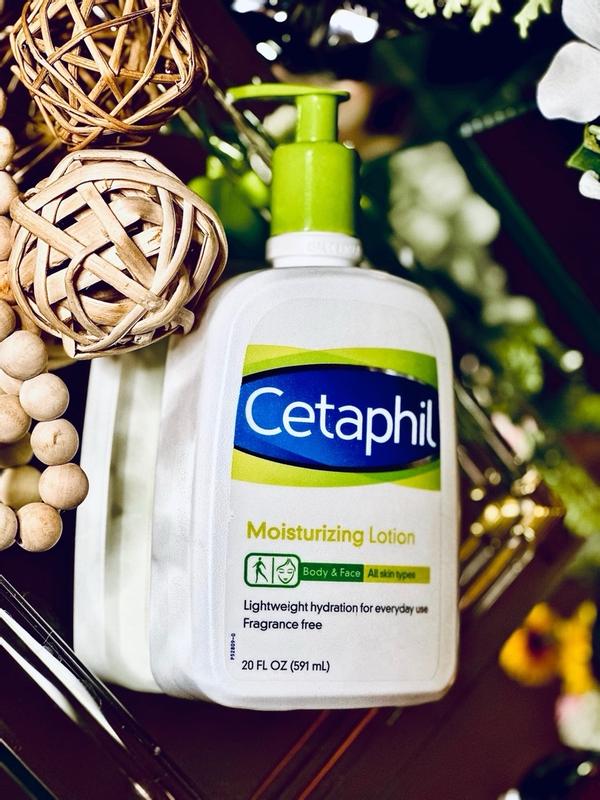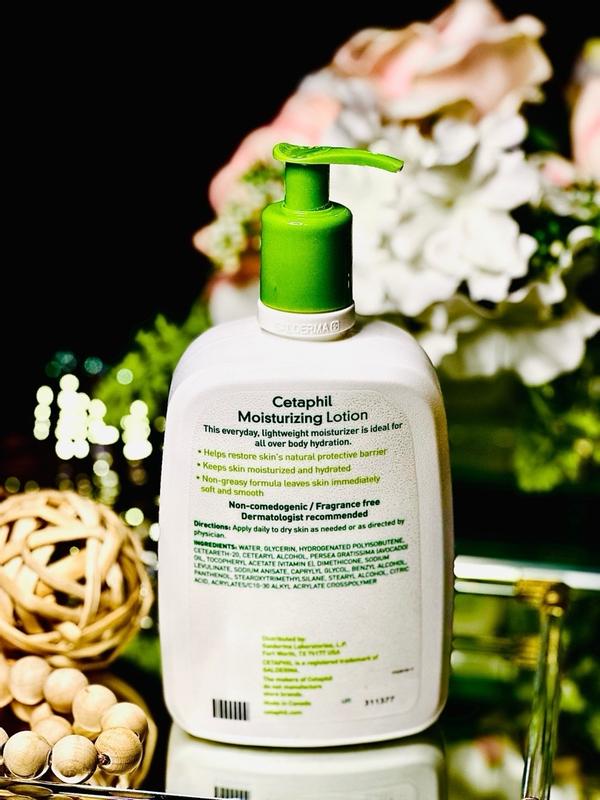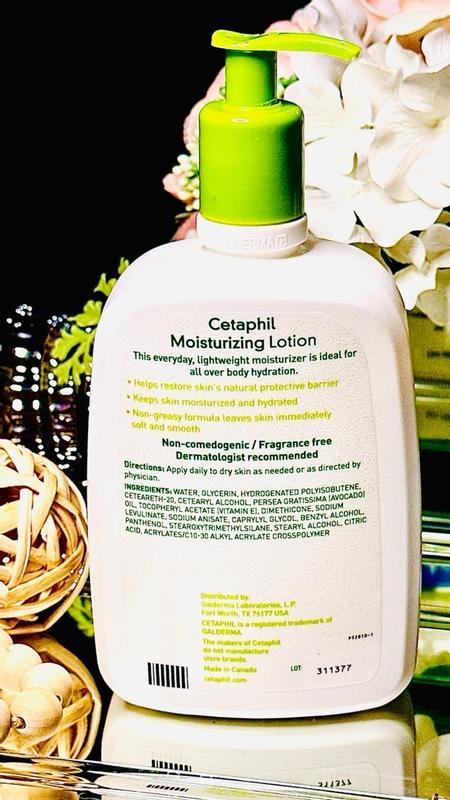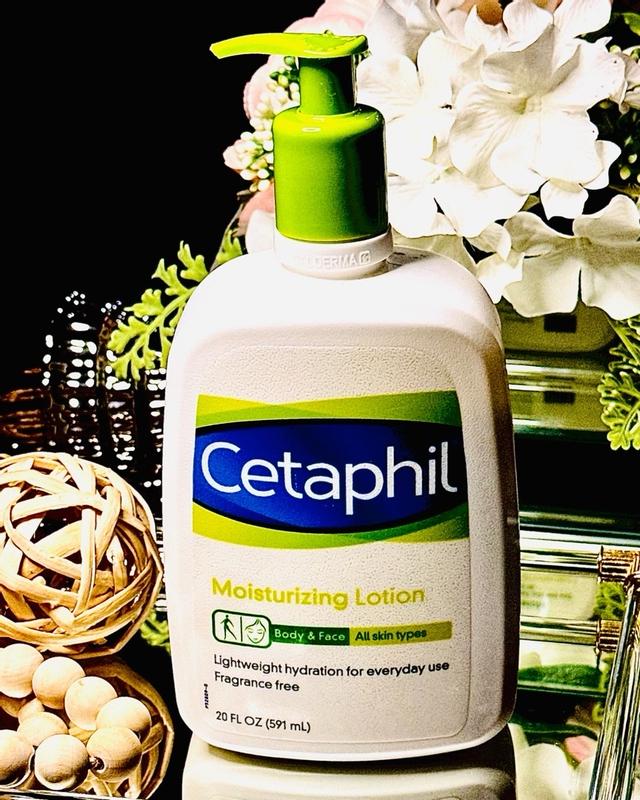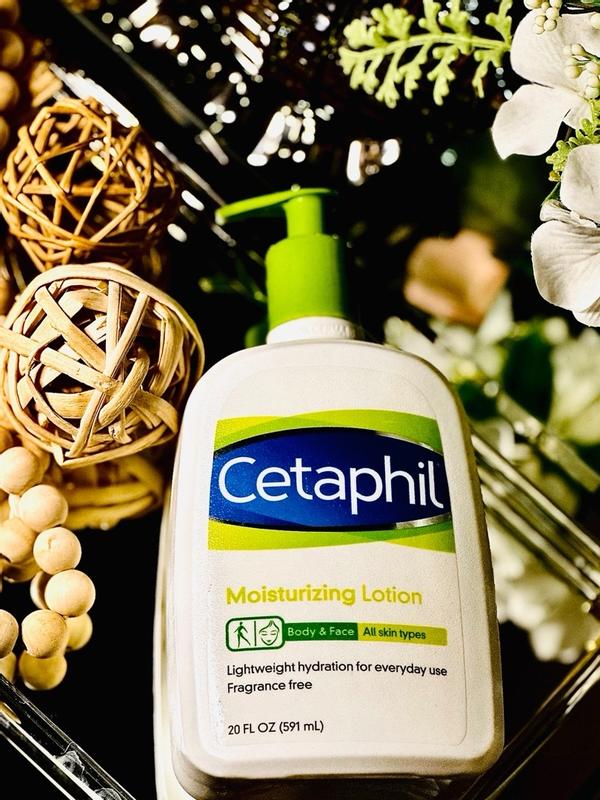I am regular user of Cetaphil moisturizing lotion. Cetaphil Moisturizing Lotion always my first choice when it comes to pick a daily moisturizer due to its non-comedogenic and fragrance-free formula which is suitable for sensitive skin. It contains a blend of vitamins, emollients and avocado oil to hydrate and repair the skin and its lightweight texture and ability to address skin sensitivity. Regular use of Cetaphil Moisturizing Lotion on face and body can provide several benefits as its gentle and non-irritating formula which is suitable for sensitive skin and won't clog pores or cause breakouts. I feel my skin Hydrated after every use and provides long-lasting moisture to my dry skin. It is a fragrance-free lotion and also non-comedogenic which means it’s ideal for acne-prone skin. It is the best available lotion in the market which is endorsed by skin experts and suitable for sensitive, dry or combination skin and improves overall skin health. I love my “Cetaphil” and it’s been years now using it and it is a gentle, effective, and versatile option for skin hydration.

Sensitive Skin Awareness Month
For 75 years, Cetaphil has been committed to advancing skincare science to provide you with the best sensitive skincare solutions. Every April, we launch Sensitive Skin Awareness Month - a month dedicated to highlighting the causes and signs of sensitive skin, offering guidance on how to care of this skin type.
UNDERSTANDING SENSITIVE SKIN
Sensitive skin affects up to 70% of people around the world and can be defined in many different ways.1 At Cetaphil, we characterize sensitive skin as unpleasant skin sensations such as stinging and burning, identifying 5 signs of skin sensitivity: dryness, irritation, roughness, tightness, and a weakened skin barrier.
To understand sensitive skin, we use skin-based science when creating products specifically formulated to address five signs of sensitivity.

How you can join Sensitive Skin Awareness Month
The best way to support our Skin Sensitive Awareness Month is by joining us in promoting awareness of sensitive skin - explore our comprehensive tips and advice on this page, along with other articles on sensitive skincare, and feel free to share them!
It’s important that if you have sensitive skin, you identify and understand your own skincare needs. Unsure about your needs? Visit our Skincare Digital Assistant page to utilize our digital skincare tools, helping you determine what your skin requires and helping you discover the most suitable products for you.

Skincare for sensitive skin
When you have sensitive skin, it’s very important that you choose the correct skincare routine, including the most suitable products for your skin type.
Choosing the right sensitive skin routine
Although there are several signs of sensitivity to look out for, sensitive skin can also be dry, oily, or combination. Depending on your skin, you may need a tailored routine with slightly different products.
For example, if you have oily skin, you may want to look out for products which are non-comedogenic - this means that they will not clog your pores.2 Cetaphil offers a range of products for sensitive skin which will not clog your pores - including cleansers and moisturizers.
If you’re new to skincare routines, or you want to make sure that you are using the best routine for your skin type, take a read of some of our skincare routine articles.
QUICK DOS AND DON'TS
FOR SENSITIVE SKIN
Here are a few quick tips for things you should and shouldn't do if you have sensitive skin.
The dos for sensitive skin
Do:
● Use products that support your skin moisture barrier
● Patch test before applying new products
● Include products with sun protection (SPF) daily
● Choose the right moisturizer
The don'ts for sensitive skin
Don’t:
● Use very hot or cold water when washing
● Rub skin too much when drying
● Over-exfoliate your skin
● Buy products not designed for sensitive skin
Finding sensitive skin products that suit your skin type
If you know what your skin type is, the next step is to select appropriate products. Visit our Product Finder to discover products to use in your science-based skincare routine - tailored to your sensitive skin, whether it's normal, dry, oily, or combination.


BEST INGREDIENTS FOR SENSITIVE SKIN
While our Product Finder can help you select a range of suitable options for your sensitive skin routine, it’s also important to be aware of ingredients that can be beneficial to sensitive skin.
Explore some of the ingredients included in Cetaphil products to find out more about how they could help to nourish, moisturize, or soothe your sensitive skin.
The skin science behind skincare
The exact reasons behind why people have sensitive skin are not fully understood, but it is believed that sensitive skin is linked to damage to the skin’s surface barrier.1,5
Some factors believed to trigger and increase the risk of sensitive skin include gender, age, weather conditions, sun exposure, skincare products and makeup, and environmental pollutants. To reduce some of these risks, it’s recommended to wear sunscreen every day and use products that help support your skin’s surface barrier, as well as using products specifically designed for sensitive skin.1,5
Cetaphil provides science-based sensitive skincare products, backed up by more than 600 clinical studies involving over 35,000 patients, ensuring all Cetaphil products are based on known skin science.

What doctors have to say about Cetaphil products for sensitive skin

“Cetaphil is a science-backed brand that I trust to provide gentle yet effective formulas that are safe for even the most sensitive skin.”
Dr Caroline Robinson

"CETAPHIL SI A BRAND DEVELOPED AND TRUSTED BY DERMATOLOGISTS. WITH SKIN SCIENCE IN MIND, IT USES INGREDIENTS THAT ARE SAFE, GENTLE, AND
EVEN THE MOST NES STVIE SERFECT BRAND OFR"
Dr Kiran Miran

Customer reviews
SENSITIVE SKIN FAQS
The American Academy of Dermatology Association (AAD) suggests applying a product twice a day for up to 10 days to a test spot on your body where the product won’t be rubbed or washed away. Leave it there for as long as you would normally apply the product for. If you don’t have a skin reaction, then it’s usually safe to use the product.*3
Since your skin may react differently to certain products compared to others, it’s important to understand what products may trigger your sensitivity. Patch test if you are unsure. Some ingredients which could cause possible irritation to sensitive skin include alpha-hydroxy acids (AHAs), some drying alcohols, and some fragrances.*3,4
Cetaphil's fragranced products are designed with skin sensitivity in mind, but some Cetaphil products also come as fragrance-free options for individuals who prefer scentless products.
All Cetaphil moisturizers are designed to tackle five signs of sensitivity, so look out for Cetaphil products which are suitable for your specific skin type. For example, if you have normal to dry sensitive skin, then Cetaphil Moisturizing Cream and Cetaphil Moisturizing Lotion are great options. However, if you have combination, sensitive skin, then Cetaphil Daily Oil-Free Hydrating Lotion, also available with SFP35, may be a better match for your skin.
If you want to know the difference between creams and lotions, and which one might suit your skin best, read our article - What’s the difference between face or body creams and lotions?
Triggers for sensitive skin can include skincare products and makeup, so your selection of foundation or eye makeup could be contributing to your skin’s sensitivity.*1,5 Conducting patch tests on areas of your skin with new skincare or makeup products can help reduce this risk. Find out more about the causes of sensitive skin in our article - Your Guide to Sensitive Skin.
Changes to the weather and different weather conditions have been found to affect sensitive skin, including sun exposure, hot weather, cold weather, dry air, humidity, wind, and air conditioning.*1 So one of the best things you can do is to use products which help protect your skin’s surface barrier, and to daily use sunscreen to protect your skin from the sun. Don’t forget opting for sunscreens which are suitable for sensitive skin. *5
References
- Farage MA. The Prevalence of Sensitive Skin. Front Med (Lausanne). 2019; 17;6:98. doi: 10.3389/fmed.2019.00098.
- How to Control Oily Skin. American Academy of Dermatology Association. Available at https://www.aad.org/public/everyday-care/skin-care-basics/dry/oily-skin Accessed 12 Feb, 2024.
- How to test skin care products. American Academy of Dermatology Association. Available at https://www.aad.org/public/everyday-care/skin-care-secrets/prevent-skin-problems/test-skin-care-products Accessed 12 Feb, 2024.
- Duarte I, Silveira JEPS, Hafner MFS et al. Sensitive skin: review of an ascending concept. An Bras Dermatol. 2017; 92(4):521-525. doi: 10.1590/abd1806-4841.201756111.
- Misery L, Weisshaar E, Brenaut E, et al. Special Interest Group on sensitive skin of the International Forum for the Study of Itch (ISFI). Pathophysiology and management of sensitive skin: position paper from the special interest group on sensitive skin of the International Forum for the Study of Itch (IFSI). J Eur Acad Dermatol Venereol. 2020;34(2):222-229. doi: 10.1111/jdv.16000.
- Dry Skin: Tips for managing. American Academy of Dermatology Association. Available at https://www.aad.org/public/diseases/a-z/dry-skin-self-care Accessed 12 Feb, 2024.
- How to Safety Exfoliate at Home. American Academy of Dermatology Association. Available at https://www.aad.org/public/everyday-care/skin-care-secrets/routine/safely-exfoliate-at-home Accessed 12 Feb, 2024.



























